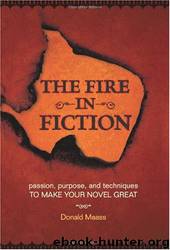The Fire in Fiction by Donald Maass

Author:Donald Maass [Maass, Donald]
Language: eng
Format: epub
Published: 2011-05-03T07:00:00+00:00
DIFFERENT WAYS OF RELATING A STORY
There are many ways to tell a story, many points of view from which to look. What sort of storyteller are you? Are you a benevolent observer, reporting what happens to your characters with objective neutrality? Or are you an active participant: pulling strings, stacking the deck, letting your reader know how you feel, and calling attention to your themes?
What about point of view? Do you lurk in the third person or vocalize in first person? Do you stick to your protagonist's point of view, widen to others, or explore unexpected perspectives?
There is nothing wrong with any particular choices. What bugs me is that many writers do not seem to have made a choice in the first place. Most manuscripts wander along in the way that it first occurred to their authors to write them. They do not confront me, insist that I listen, or seek to surprise me with a different way of seeing. They feel flat.
Choices of first vs. third person, or present tense vs. past tense, are fundamental to how a novel reads. There's no right way, just the way that works best and feels best to you. The subject has been covered in many other books.
What concerns me more is the straightforward and chronological approach of virtually all manuscripts. That's not bad in itself, but it does make for a certain sameness. Stories gear up, get going, plod dutifully through the middle, and finish. Getting to the end can be more a duty than a necessity.
There are so many ways to relate what happens and so many perspectives to bring. Why not take advantage of some of those options?
Matt Ruff s genre-bending novel Bad Monkeys (2007) centers on Jane Charlotte, a member of an evil-battling organization named The Department for the Final Disposition of Irredeemable Persons (or "Bad Monkeys" for short). They kill nasty people. The novel is Jane's personal story, related after her capture in a long psychotherapy session at the Las Vegas County Jail. Early on she tells how as a kid she sought out the school janitor for drugs but instead discovered that he was a serial killer:
You thought you might have better luck with the janitor?
Sure. I mean, four o'clock in the afternoon, the guy goes into an abandoned part of the building. What for? Not to mop floors. And he wasn't carrying any tools, so he couldn't be doing repairs. So what's that leave?
Any number of things, I'd imagine. But I take it you were hoping for vice?
You bet I was. And we're talking about a young guy with long hair and a Jesus beard. So what kind of vice was he likely to be into.
But it wasn't what you thought.
No, actually, it was what I thought. It's just, it was also more than what I thought.
The question-and-answer pattern of Ruff s novel not only allows him to add extra layers of tension to Jane's highly suspect account of herself, but also gives him a chance to convey more of Jane's personality.
Download
This site does not store any files on its server. We only index and link to content provided by other sites. Please contact the content providers to delete copyright contents if any and email us, we'll remove relevant links or contents immediately.
Asking the Right Questions: A Guide to Critical Thinking by M. Neil Browne & Stuart M. Keeley(5751)
Autoboyography by Christina Lauren(5222)
Eat That Frog! by Brian Tracy(4512)
Dialogue by Robert McKee(4385)
Sticky Fingers by Joe Hagan(4183)
Journeys Out of the Body by Robert Monroe(3609)
Annapurna by Maurice Herzog(3462)
Full Circle by Michael Palin(3440)
Schaum's Quick Guide to Writing Great Short Stories by Margaret Lucke(3368)
Elements of Style 2017 by Richard De A'Morelli(3336)
The Art of Dramatic Writing: Its Basis in the Creative Interpretation of Human Motives by Egri Lajos(3057)
Atlas Obscura by Joshua Foer(2946)
Why I Write by George Orwell(2944)
The Diviners by Libba Bray(2926)
The Fight by Norman Mailer(2923)
In Patagonia by Bruce Chatwin(2919)
The Mental Game of Writing: How to Overcome Obstacles, Stay Creative and Productive, and Free Your Mind for Success by James Scott Bell(2896)
Venice by Jan Morris(2566)
The Elements of Style by William Strunk and E. B. White(2468)
